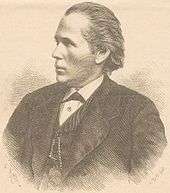Dillingen an der Donau
Dillingen, or Dillingen an der Donau (Dillingen on the Danube) is a town in Swabia, Bavaria, Germany. It is the administrative center of the district of Dillingen.
Dillingen an der Donau | |
|---|---|
King's Street | |
 Coat of arms | |
Location of Dillingen an der Donau within Dillingen district  | |
 Dillingen an der Donau  Dillingen an der Donau | |
| Coordinates: 48°34′N 10°28′E | |
| Country | Germany |
| State | Bavaria |
| Admin. region | Schwaben |
| District | Dillingen |
| Government | |
| • Mayor | Frank Kunz (CSU) |
| Area | |
| • Total | 75.59 km2 (29.19 sq mi) |
| Elevation | 422 m (1,385 ft) |
| Population (2018-12-31)[1] | |
| • Total | 18,978 |
| • Density | 250/km2 (650/sq mi) |
| Time zone | CET/CEST (UTC+1/+2) |
| Postal codes | 89407 |
| Dialling codes | 09071 |
| Vehicle registration | DLG |
| Website | www.dillingen-donau.de |
Besides the town of Dillingen proper, the municipality encompasses the villages of Donaualtheim, Fristingen, Hausen, Kicklingen, Schretzheim and Steinheim.
Schretzheim is notable for its 6th to 7th century Alemannic cemetery, 630 row graves in an area of 100 by 140 metres. The counts of Dillingen ruled from the 10th to the 13th century; in 1258 the territory was turned over to the Prince Bishops of Augsburg. After the Reformation, the prince-bishops of Augsburg moved to the Catholic city of Dillingen and made it one of the centers of the Counter-Reformation.
In 1800, during the War of the Second Coalition, the armies of the French First Republic, under command of Jean Victor Moreau, fought Habsburg regulars and Württemberg contingents, under the general command of Pál Kray. Kray had taken refuge in the fortress at Ulm; Moreau diverted his army to approach Ulm from the east and, after a small group of men captured a foothold on the northern bank of the Danube, his forces were able to move against the fortress on both sides of the river. At this battle, the culmination of the Danube Campaign of 1800, Moreau forced Kray to abandon Ulm and withdraw into eastern Bavaria.[2]
A university was established in 1549, but was closed by Napoleon in 1804. The philosophical and theological faculties still existed in the 20th century. In 1971, however, it became a part of the Bavarian Center for the Education and Training of Teachers and Personnel Management (Akademie für Lehrerfortbildung und Personalführung). One of the largest employers in the city is Bosch and Siemens Household Appliances, producer of household applicances.
Local council
The elections in March 2014 showed the following results:
| Party | Seats |
|---|---|
| CSU | 8 |
| SPD | 2 |
| Alliance 90 /The Greens | 1 |
| Free voters Bavaria | 2 |
| Schretzheimer Liste | 2 |
| Wählergemeinschaft Steinheim | 2 |
| Wählervereinigung Kicklingen | 2 |
| Wählerschaft Fristingen | 2 |
| Bürgergemeinschaft Hausen | 2 |
| Allgemeine Wählerliste Donaualtheim | 1 |
Notable people
- Leonhard Wiedemann (around 1470-1646), abbot in Ottobeuren
- Heinrich Vogtherr (1490-1556), painter
- Walpurga Hausmännin (1510 / 1527-1587), victim of Dillingen witchcraft process
- Johann Alois Jehle, country Defension colonel and commander of Braunau during Bavarian National Uprising in 1705. On 18 December In 1705 he called for 21 December, the Braunau Parliamenta
- Sebastian Franz von Braunn (1762-1842) Bavarian Lieutenant General
- Clemens von Raglovich for Rosenhof (1766-1836), Bavarian General and Reichsrat
- Georg Wilhelm Ritter von Manz (1804-1867), Lieutenant General, Bavarian Minister of War
- Sister Theresia Haselmayr (1808-1878), Generaloberin, co-founder of Regens Wagner Stiftungen
- Wilhelm Bauer (1822-1875), the inventor of the (German) submarine
- Max Joseph Oertel (1835-1897), university professor and pioneer of medical science

- Friedrich Rittelmeyer (1872-1938) Protestant theologian and co-founder of the Christian Community
- Georg Philipp Wörlen (1886-1954), painter and graphic artist
- Josef Becker-Dillingen (1891-1983), agricultural and horticultural scientist
- Ingeborg Geisendörfer (1907-2006), German politician (CSU)
Connected with Dillingen

- Matthias Klostermayr (1736-1771), leader of a gang of robbers, convicted in Dillingen and strangled, then smashed, beheaded and quartered.
- Johann Michael Sailer (1751-1832), a Catholic theologian, professor of ethics and pastoral theology in Dillingen 1821 Domkapitular and 1822 auxiliary bishop with right of succession, in 1829 Bishop of Regensburg
- Christoph von Schmid (1768-1854), Catholic theologian
- Sebastian Kneipp (1821-1897), Catholic priest and hydrotherapeut, began in 1848 his studies of theology in Dillingen.
- Heinz Piontek (1925-2003), writer
Twin towns



References
- "Fortschreibung des Bevölkerungsstandes". Bayerisches Landesamt für Statistik und Datenverarbeitung (in German). July 2019.
- "Höchstädt", History of the Wars of the French Revolution: Including Sketches of the Civil History of Great Britain and France, from the Revolutionary Movements, 1788, to the Restoration of a General Peace, 1815, Kuhl, France, 1820, p. 183.
- http://www.dillingen-donau.de/index.php?id=92
External links
- The town's official website
- Photos of works of art in Dillingen, in the Warburg Institute Iconographic Database